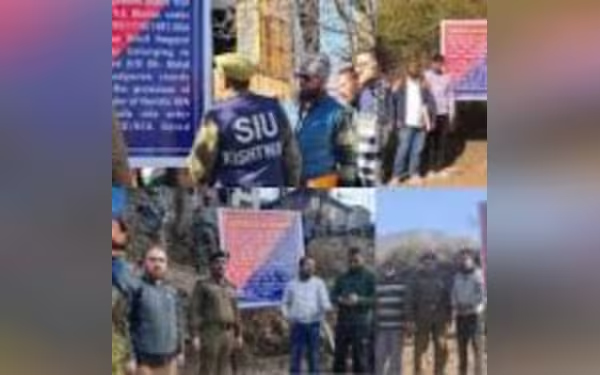Sunday, December 22, 2024 02:25 PM
Indian Police Seize Properties of 13 Kashmiris in Kishtwar
- Indian police attach properties of 13 Kashmiris in Kishtwar.
- Critics claim actions aim to suppress Kashmiris' political voice.
- Human rights advocates raise concerns over property seizures.
 Image Credits: pakistantoday
Image Credits: pakistantodayIndian police have seized properties of 13 Kashmiris in Kishtwar, raising concerns over human rights and political suppression in the region.
In recent developments in Jammu and Kashmir, the Indian police have intensified their crackdown on local Kashmiris, furthering a controversial policy that many believe aims to dispossess them of their properties. This latest action, which saw the attachment of properties belonging to 13 individuals in Kishtwar district, is part of a broader strategy that critics argue is designed to suppress the political voice of Kashmiris and alter the region's demographic landscape.
According to reports, the properties seized include land owned by individuals such as Shahnawaz Kant, Nayeem Ahmed, and Mohammad Iqbal, among others. This operation is not an isolated incident; it follows a pattern of property seizures that have escalated since the revocation of Jammu and Kashmir's special status in August 2019. Many locals view these actions as a direct attack on their rights and identity, as the Indian government appears to be facilitating the settlement of non-local individuals while marginalizing the indigenous population.
In a related context, the Indian National Investigation Agency (NIA) recently declared 36 youths from Kishtwar as absconders, leading to further property attachments by the police. This ongoing campaign has raised significant concerns among human rights advocates and local communities, who fear that such measures are not only unjust but also aimed at erasing the unique cultural identity of Kashmir.
Moreover, the situation has been exacerbated by incidents such as the recent raid on the home of Zahid Ashraf, Vice Chairman of the Jammu and Kashmir Young Men’s League. Reports indicate that Indian forces harassed his family members, including his elderly mother, and confiscated personal belongings, including mobile phones. Such actions have been condemned by local political groups, who argue that they reflect the increasing nervousness of Indian authorities in the face of growing dissent.
As the situation in Jammu and Kashmir continues to unfold, it is crucial for the international community to pay attention to these developments. The ongoing suppression of local voices and the systematic targeting of properties raise serious questions about human rights and the rule of law in the region. Understanding the implications of these actions is vital, not only for the people of Kashmir but also for the broader discourse on justice and equity in conflict zones around the world. The plight of Kashmiris serves as a reminder of the importance of safeguarding human rights and ensuring that all voices are heard in the quest for peace and stability.













